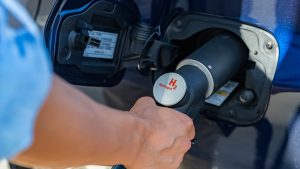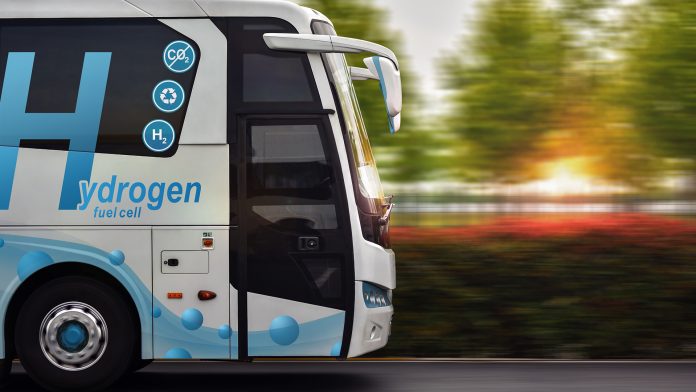Rebecca Zeitlin, Head of Communications and Marketing at Protium Green Solutions, the UK’s largest green hydrogen energy company, discusses hydrogen’s role in the transport ecosystem.
Hydrogen can store and deliver clean energy for many uses across the UK – including transportation – with the potential to significantly reduce CO2 emissions at the tailpipe. In a world shifting to fewer CO2 emissions, this would be a significant step forward as whatever vehicles run on hydrogen fuel will only emit water as a byproduct.
According to a January 2023 UK parliamentary committee report, electric batteries now have a ‘seemingly unassailable’ lead over hydrogen in passenger cars.
While battery electric vehicle (BEV) technology has matured significantly and BEVs are commonplace on our roads, hydrogen continues to have a compelling long-term role in several other modes of transport, especially those requiring large payloads or long ranges. These include buses, trucks, construction machinery, industrial machinery, trains, and even aviation.
Protium Green is a green hydrogen company that delivers hydrogen fuel solutions to companies, and it has several ongoing projects designed to boost the hydrogen fuel industry. Head of Communications and Marketing, Rebecca Zeitlin, details the areas in which hydrogen fuel could be beneficial.
The current HGV market
Figures from the Society of Motor Manufacturers and Traders (SMMT) have suggested that zero-emission trucks enjoyed a record market share in Q3 2023 demonstrating growing interest in adopting zero-emission trucks in all segments, including hydrogen fuel cell trucks. However, infrastructure development is still needed to connect regions along key transport routes to meet this demand and accelerate the adoption of zero-emission vehicles.
There is also a need to ensure access to hydrogen produced proximate to the refuelling infrastructure – reducing the requirement to transport hydrogen, resulting in increased cost and a larger carbon footprint.

At Protium, we’ve focused on a collaborative approach to ensure that all aspects of the hydrogen vehicle value chain work in concert to scale deployment. Small fleet trials, adopted quickly, will prove concepts and support a phased approach to infrastructure development.
The HyHAUL integrated end-to-end solution
An example of this would be our Protium Hydrogen Aggregated UK Logistics (HyHAUL) project, which is supported by approximately £30m in grant funding from Innovate UK.
As part of the UK Department for Transport’s Zero Emission HGV Infrastructure Demonstrator, HyHAUL is set to initially roll out 30 hydrogen fuel cell HGVs to haulage operators primarily operating along the M4 corridor by 2026, with further ambition to deploy 300 vehicles by 2030.
This first-of-its-kind project targets the UK’s heaviest, most polluting HGVs, delivering zero-emission HGVs weighing up to 44 tonnes. Alongside HGVs with operational range and flexibility, HyHAUL will also deploy refuelling stations to ensure viable truck operations across designated routes.
HyHAUL brings together the long-distance hydrogen HGV value chain, including green hydrogen generation, hydrogen logistics, refuelling infrastructure providers, and fuel cell HGV manufacturers.
Hydrogen will be initially sourced from multiple green hydrogen projects across South Wales, including Protium’s Pioneer 2.
HyHAUL will provide vehicle OEMs and fleet operators with vital operational data on the performance of first-generation fuel cell electric trucks and will help to remove barriers to broader adoption across the industry.
In short, the project provides solutions to key barriers, from mobilising the full value chain to expanding hydrogen production and infrastructure.
Adopting hydrogen is still a difficult decision for many operators, so programmes like this are an important way to provide access ahead of full fleet transition.
Supporting vehicle trials
As well as HGVs, hydrogen has a key role to play in smaller vehicles with demanding jobs.
Consider roles like utility engineers responding to emergencies – in these roles, vans carry significant equipment payloads and must be on the road covering longer ranges with limited downtime. In many cases, vans are parked at the engineer’s home overnight. In this example, BEV vans are less suitable than FCEVs in these types of fleets.
Protium is currently supplying hydrogen to Wales & West Utilities, who are working with First Hydrogen to trial an FCEV van specifically for this role.
In its first year of operation, Protium’s Pioneer 1 hydrogen production facility has supplied several vehicle trials in addition to the Wales & West Utilities trial. This includes vehicles like fuel cell buses operating in both England and Wales. We have also supported trials of hydrogen-fuelled refuse collection vehicles.
Across all of our trial experiences, we have seen hydrogen’s ability to eliminate tailpipe emissions while also providing ranges and payloads more similar to diesel equivalents.

Supporting trials of vehicles of all sizes helps vehicle manufacturers get new vehicles out on the roads, generating data and enabling vehicle optimisation.
It also provides initial users of these vehicles with proof of concept – building confidence and wider support for fleet transition. It also helps create a demand picture for hydrogen producers like Protium, allowing us to best site production assets and other infrastructure.
What about aviation?
Aviation is extremely challenging to decarbonise, and hydrogen is one of the routes to decarbonisation currently being investigated.
There are two primary uses for hydrogen in aviation – as a direct fuel for propulsion and as a feedstock for synthetic fuels. For propulsion, hydrogen can be combusted through modified engines or converted into electrical power via fuel cells.
As with HGVs, adoption and deployment face wide-ranging challenges, including technology development and certification, infrastructure, and access to very large volumes of hydrogen. Protium is working with the aerospace ecosystem to supply hydrogen-enabling early testing, with Project HEART specifically designed to enable some of these important tests.
Project HEART is a collaborative R&D project partly funded by the UK Research & Innovation Future Flight Challenge, which is facilitating an end-to-end hydrogen infrastructure capable of safely fuelling hydrogen aircraft while simultaneously showcasing the increasing feasibility of green hydrogen technology within aviation.
The endeavour will also help to shape future government policy in the sustainable aviation sector.
Project HEART’s initial focus lies in regional airports, where it is developing a refuelling solution catering to aircraft carrying nine to 19 passengers and a range of 500 miles.
By harnessing sector-leading expertise and cutting-edge technology, the project is delivering a comprehensive solution that encompasses off-site hydrogen production, its transference to the site, and refuelling of the fuel cell-electric propulsion aircraft via a mobile refueller.
Future applications of hydrogen in transport
As we look across the range of transport modes, a growing number present challenges for decarbonisation via batteries. These are the applications where hydrogen could be the solution, such as fleet operations, HGVs, aviation, and more.
Trials are an essential way for operators to explore hydrogen without committing to a full fleet transition straight away. They also enable the hydrogen ecosystem to better understand demand and develop suitable production.
As an increasing number of companies request hydrogen for decarbonisation, Protium’s operational electrolysers at Pioneer 1, Pioneer 2, and future sites will continue to deliver hydrogen for trials and build the value chain for the future.
Please note, this article will also appear in the seventeenth edition of our quarterly publication.










